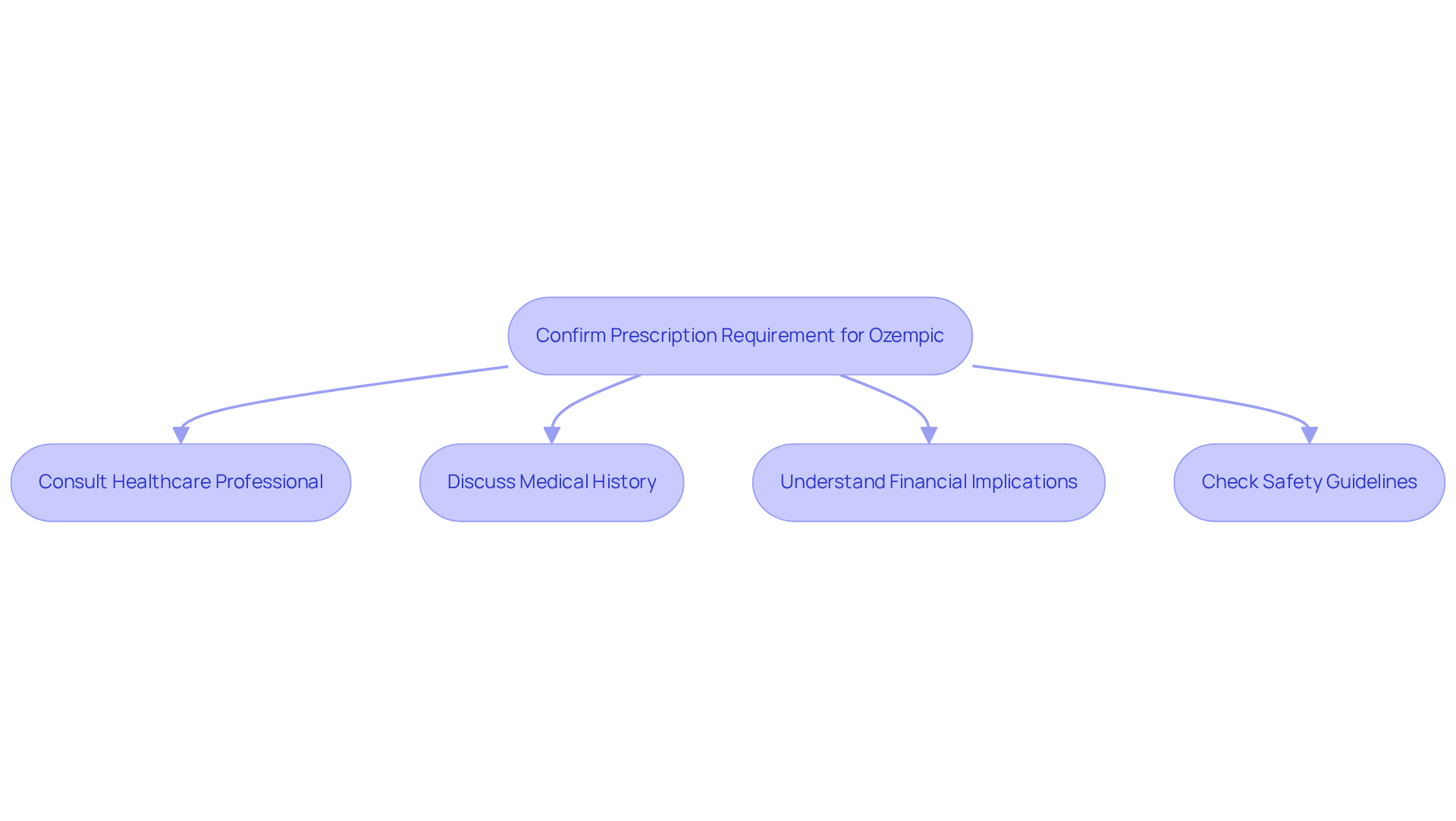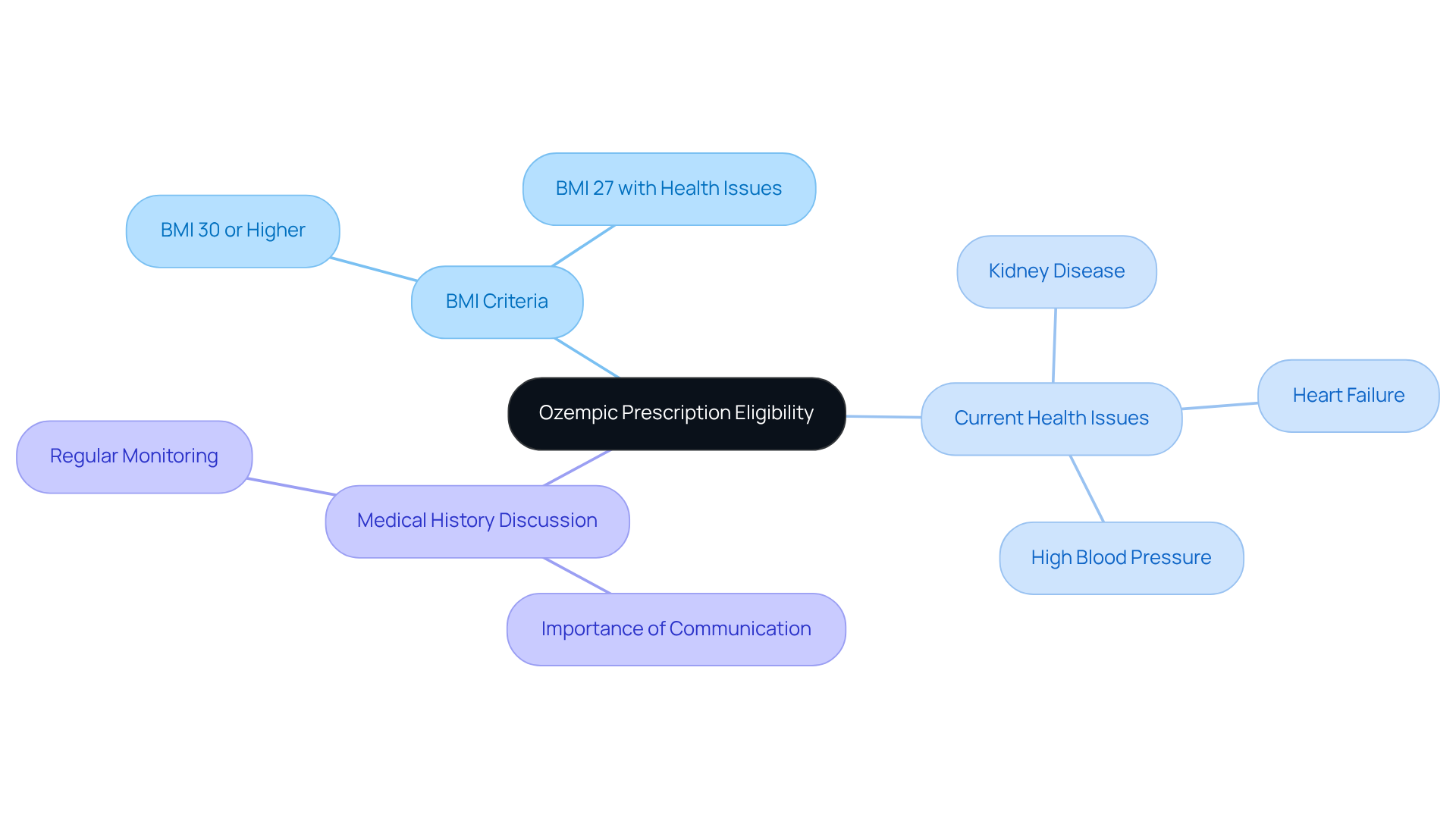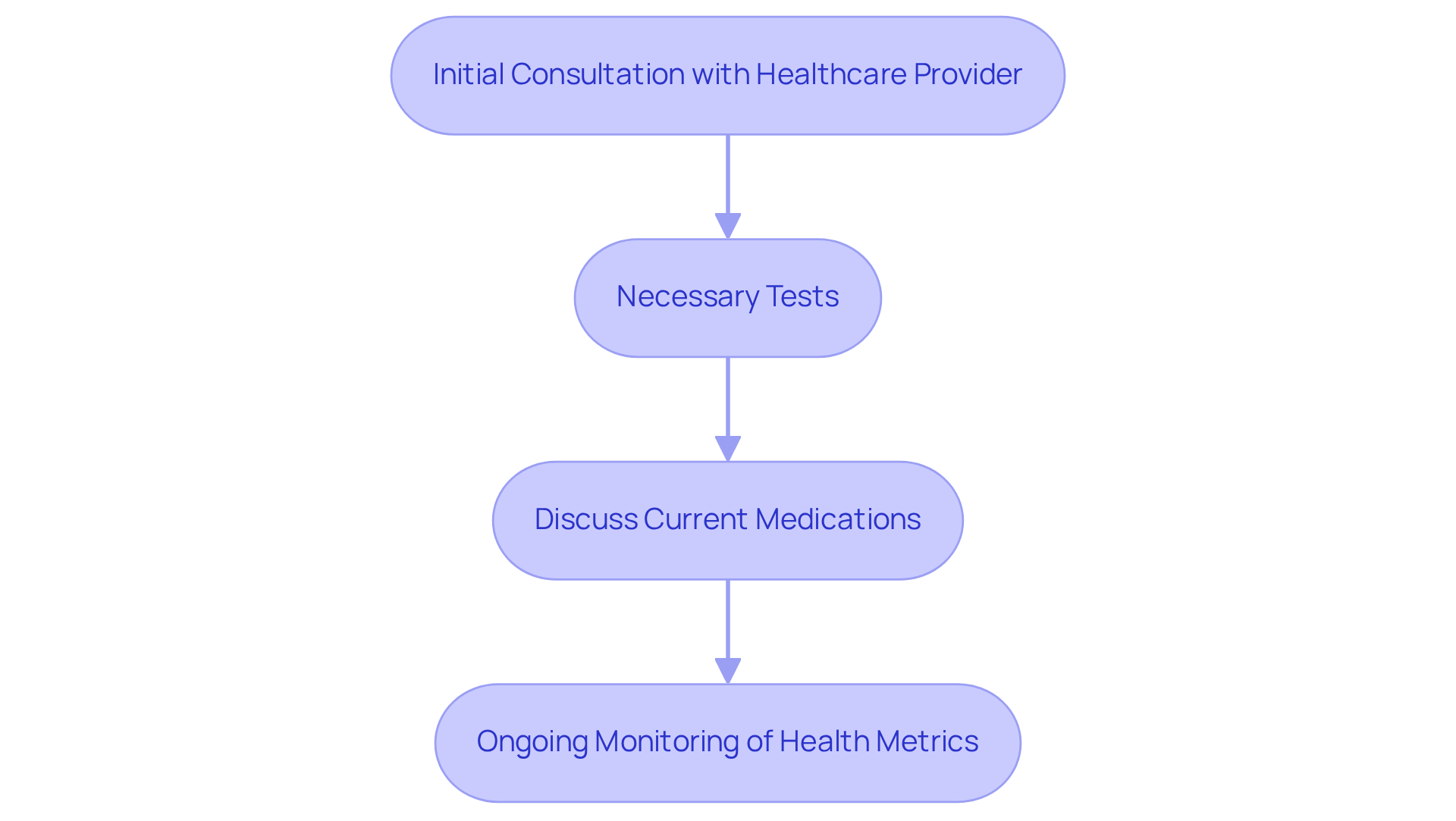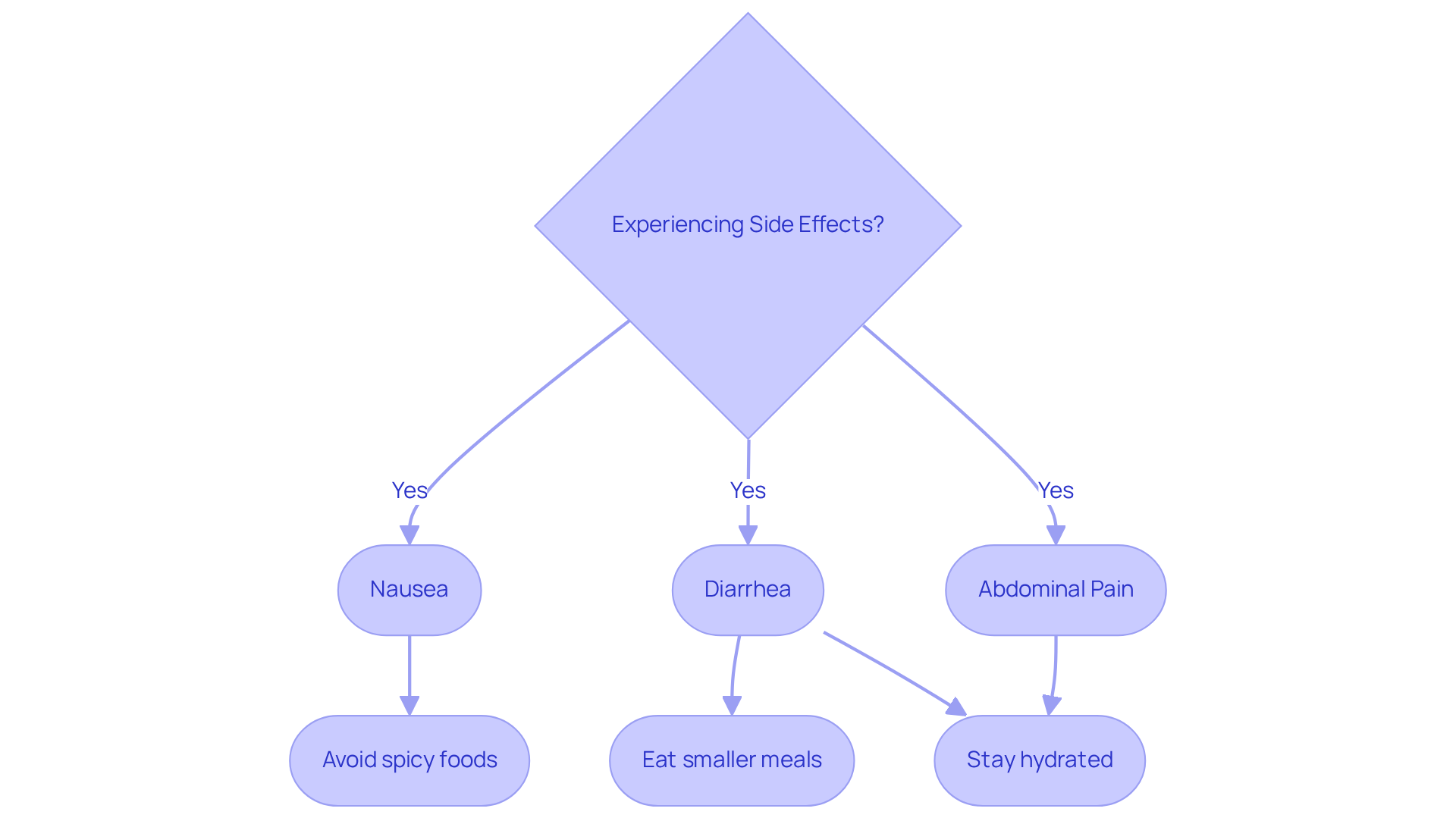Overview
You need a prescription for Ozempic, as it’s classified as a prescription-only medication and isn’t available over the counter. We understand that navigating weight loss or diabetes can be challenging, and that’s why it’s so important to consult a certified healthcare professional. They can help assess your eligibility and discuss tailored treatment plans with you.
In addition, prioritizing safety and personalized care is crucial in managing your health journey. You’re not alone in this; seeking guidance from a healthcare provider ensures that you receive the support you need. Remember, taking this step is a positive move towards achieving your health goals.
Introduction
Navigating the world of prescription medications can often feel like a maze. We understand that it can be especially challenging when it comes to understanding specific requirements for drugs like Ozempic. This essential checklist aims to clarify the steps necessary to confirm whether a prescription is needed, the eligibility criteria for obtaining it, and the importance of thorough medical evaluations.
As you embark on your weight management journey, you might wonder: what are the critical factors that determine access to Ozempic? Moreover, how can you ensure a safe and effective treatment plan? You’re not alone in this journey, and it’s important to have the right information at your fingertips.
Confirm Prescription Requirement for Ozempic
-
We understand that navigating medication options can be overwhelming. It’s important to confirm, do you need a prescription for ozempic, as the medication is classified as prescription-only and cannot be obtained over the counter. This aligns with the physician-supervised approach of medical loss programs at CT Medical Loss & Beyond, where we create tailored plans to meet your unique needs.
-
If you’re interested in Ozempic, you might be wondering, do you need a prescription for Ozempic? We encourage you to arrange a consultation with a certified healthcare professional at CT Medical Loss & Beyond. During this meeting, you can discuss your medical history and management objectives. Our dedicated team will work closely with you to ensure your treatment plan is specifically designed for your requirements.
-
It’s also essential to understand the financial implications when considering do you need a prescription for ozempic. The potential costs can be significant—approximately $969 for a one-month supply without insurance. We recommend checking your insurance coverage for any applicable benefits or prior authorization requirements. Additionally, consider exploring financial assistance options, such as the Novo Nordisk Patient Assistance Program, to help manage the costs associated with your weight loss journey.
-
Lastly, please be aware of the FDA’s warning against acquiring medication from unlicensed sources or online pharmacies that do not require a prescription, which raises the question, do you need a prescription for ozempic? This can pose serious safety risks. At CT Medical Weight Loss & Beyond, your safety and the effectiveness of your treatment are our top priorities. You’re not alone in this journey; we’re here to support you every step of the way.

Evaluate Eligibility Criteria for Ozempic Prescription
-
We understand that managing your weight can be challenging, especially when health conditions come into play. If your Body Mass Index (BMI) is 30 or higher, or 27 or higher with weight-related health issues like diabetes, hypertension, or cardiovascular concerns, it’s important to explore your options. Semaglutide, a GLP-1 receptor agonist, can be a helpful ally in this journey. It promotes satiety by delaying gastric emptying, which means you can enjoy smaller portion sizes while feeling fuller after meals.
-
Furthermore, it’s essential to assess any current health issues that might affect your eligibility for this medication. Conditions such as kidney disease, heart failure, or high blood pressure are significant factors in determining coverage. The good news is that GLP-1 medications have shown effectiveness in managing diabetes and aiding weight loss, making them a beneficial choice for those who qualify.
-
Moreover, be prepared to discuss your complete medical history with your healthcare provider. This open dialogue will help evaluate your suitability for the medication, ensuring that any potential risks are managed effectively. Regular monitoring is crucial, especially for individuals with a BMI of 30 or higher, as personal reactions to discontinuing the medication can vary. Remember, you’re not alone in this journey; support is available every step of the way.

Complete Medical Evaluation Process
-
We understand that navigating your healthcare can feel overwhelming. That’s why it’s important to arrange a meeting with your healthcare provider for a thorough assessment. This initial consultation allows for an in-depth conversation about your health history and current medications, ensuring a customized approach to your care that truly meets your needs.
-
In addition, undergoing necessary tests is crucial for assessing your current health status. Important assessments, such as blood glucose levels and Hemoglobin A1c (A1C) tests, should be measured every 3 to 6 months after starting the medication. These tests provide valuable insights into your blood sugar control and overall metabolic health, guiding your treatment plan effectively.
-
Furthermore, discussing any medications you are currently taking is essential to avoid potential interactions with the drug. Consistent assessment of kidney and liver functions is particularly important for individuals with prior health issues, as this medication can influence these organs. If you have a history of thyroid issues, thyroid function tests may also be necessary to ensure that any existing conditions are managed appropriately before starting treatment. Remember, you’re not alone in this journey; we’re here to support you every step of the way.

Review Common Side Effects and Management Strategies
It’s important to become familiar with the typical side effects of medications like GLP-1 injectables, including nausea, diarrhea, and abdominal pain, which affect more than 1 in 10 users. Recognizing these symptoms is crucial for effective management. After all, these medications, such as Ozempic, are designed to help with weight loss by enhancing insulin secretion and reducing appetite.
We understand that dealing with side effects can be challenging. That’s why it’s a good idea to talk with your healthcare professional about strategies to manage them. Simple dietary changes, like avoiding spicy foods and opting for smaller, more frequent meals, can make a difference. Staying hydrated is also key to relieving discomfort and preventing dehydration. Given that GLP-1 can slow stomach emptying, these adjustments can be particularly beneficial.
It’s essential to monitor how you respond to the medication closely. If you experience intense or lasting side effects, please inform your healthcare professional promptly. They can help with possible dosage modifications or explore alternative options. Remember, approximately 20% of patients stop using the medication due to side effects, which highlights the importance of effective management and the need for a personalized approach on your weight loss journey. You’re not alone in this process, and support is available.

Understand the Importance of Follow-Up Appointments
Follow-up appointments with your healthcare professional are essential for tracking your progress on Ozempic. We understand that discussing changes in your body mass, side effects, or overall health can feel daunting, but these conversations are vital. Sharing your experiences openly helps your provider tailor your care plan to meet your unique needs.
Statistics show that regular follow-up visits can significantly improve patient outcomes. For instance, initial management appointments should ideally last at least 30 minutes. This dedicated time allows for a thorough discussion of your history and any challenges you might face. It’s a chance not just to assess your progress but also to celebrate those small victories along the way.
When it comes to monitoring your progress, studies indicate that Ozempic can lead to a weight loss of 6% to 10% of your total body weight. Regular assessments are key to tracking this journey and making any necessary adjustments to your treatment plan. If you experience side effects like nausea or fatigue, your healthcare provider can suggest dosage modifications or explore alternative options that might work better for you.
Remember, these follow-up appointments are not just about monitoring weight loss; they play a crucial role in your overall health journey. Engaging in these discussions ensures you receive the support and adjustments needed to effectively achieve your weight management goals. You’re not alone in this journey, and together, we can navigate the path to better health.
![]()
Conclusion
Understanding the necessity of a prescription for Ozempic is crucial for anyone considering this medication as part of their weight management journey. We understand that navigating this process can feel overwhelming, but knowing that Ozempic is a prescription-only medication is the first step toward achieving your goals. Engaging with a certified healthcare professional ensures that you receive a personalized treatment plan tailored to your unique medical history and weight management aspirations.
Throughout this journey, there are key considerations to keep in mind:
- Evaluating eligibility based on BMI and existing health conditions is essential.
- Undergoing a thorough medical evaluation helps ensure that Ozempic is the right fit for you.
- Being aware of potential side effects is important for your safety and well-being.
- Regular follow-up appointments are vital for monitoring your progress and making necessary adjustments to your treatment plan, which can significantly enhance your outcomes.
Moreover, it’s important to consider the financial implications of Ozempic. Understanding your insurance coverage and exploring potential assistance programs can alleviate some of the stress associated with costs.
In conclusion, navigating the steps to obtain Ozempic requires diligence and support. It’s imperative to consult healthcare professionals, understand eligibility criteria, and actively manage any side effects. By taking these steps, you can embark on your weight loss journey with confidence, knowing you have the necessary resources and guidance to achieve your health goals. Remember, prioritizing safety and personalized care is the key to successfully integrating Ozempic into a comprehensive weight management strategy. You’re not alone in this journey; support is available every step of the way.
Frequently Asked Questions
Do I need a prescription for Ozempic?
Yes, Ozempic is classified as a prescription-only medication and cannot be obtained over the counter. It is important to consult with a certified healthcare professional to obtain a prescription.
How can I arrange a consultation for Ozempic?
You can arrange a consultation with a certified healthcare professional at CT Medical Loss & Beyond, where you can discuss your medical history and management objectives.
What are the potential costs of Ozempic?
The potential cost for a one-month supply of Ozempic is approximately $969 without insurance. It is advisable to check your insurance coverage for any applicable benefits or prior authorization requirements.
Are there financial assistance options for Ozempic?
Yes, you can explore financial assistance options such as the Novo Nordisk Patient Assistance Program to help manage the costs associated with Ozempic.
What are the eligibility criteria for obtaining a prescription for Ozempic?
You may be eligible for Ozempic if your Body Mass Index (BMI) is 30 or higher, or 27 or higher with weight-related health issues like diabetes, hypertension, or cardiovascular concerns.
What health conditions could affect my eligibility for Ozempic?
Current health issues such as kidney disease, heart failure, or high blood pressure can significantly affect your eligibility for Ozempic.
Why is it important to discuss my medical history with a healthcare provider?
Discussing your complete medical history with your healthcare provider helps evaluate your suitability for Ozempic and ensures that any potential risks are managed effectively.
How does Ozempic help with weight management?
Ozempic, which contains semaglutide, promotes satiety by delaying gastric emptying, allowing individuals to enjoy smaller portion sizes while feeling fuller after meals.
What should I be aware of regarding the safety of obtaining Ozempic?
It is important to avoid acquiring medication from unlicensed sources or online pharmacies that do not require a prescription, as this poses serious safety risks. Always obtain your medication through legitimate channels.




